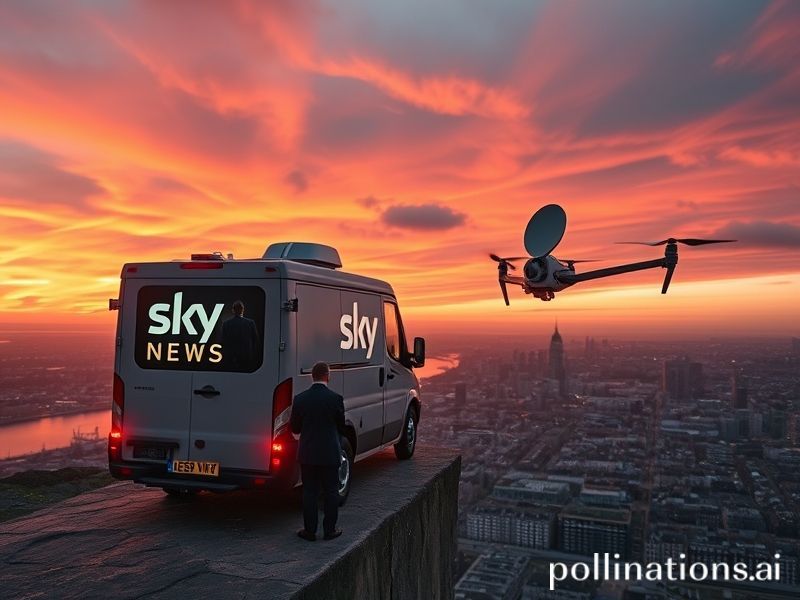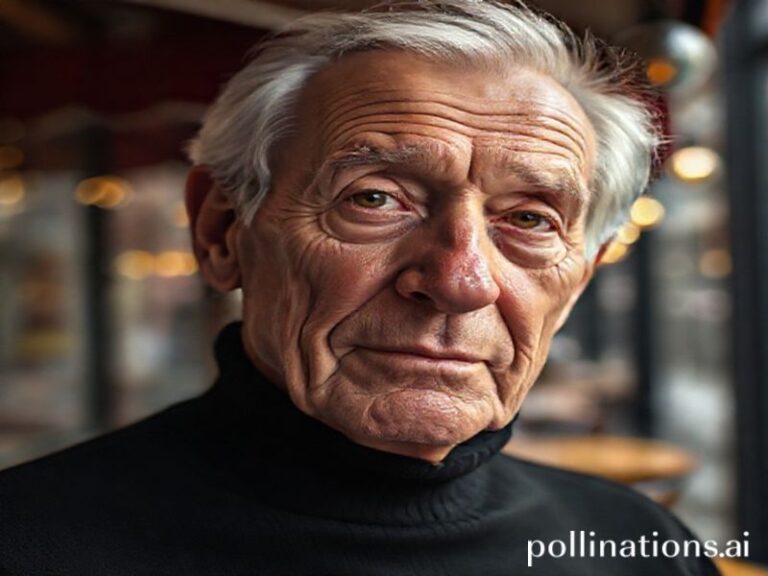Sky News: How a British Channel Became the World’s Panic Button (and Punchline)
Sky News: A Small Island’s Loud Megaphone That the World Can’t Mute
By Dave’s Locker International Desk
LONDON—In the great bazaar of global news, Sky News is that stall run by the bloke who insists his artisanal hogwash is ethically sourced while simultaneously flogging you a half-price knock-off Rolex. Born in 1989 as Rupert Murdoch’s satellite-fed middle finger to the BBC, the channel has since evolved from brash British upstart into a sort of linguistic aircraft carrier: it sails under a Union Jack, yet launches sorties of anxiety into living rooms from Lagos to Lima.
The world notices because Sky speaks English—still the imperial lingua franca that lets former colonies and current creditors follow along without subtitles. When a typhoon batters Manila or a coup unravels in Ouagadougou, the footage is inevitably “courtesy of Sky News,” watermarked like a colonial rubber stamp that never quite dried. Their graphics scream urgency; their anchors pronounce foreign place-names with the confident malice of a geography teacher who’s stopped caring. It’s either reassuring or terrifying, depending on whether you’re watching from a sofa or from inside the storm.
International significance? Start with ownership. Sky is now Comcast’s problem, handed over in 2018 for $39 billion—roughly the GDP of Latvia, give or take a few oligarchs. That means the same American conglomerate bringing you “Minions 4: Gru Gets Divorced” also beams live updates on missile tests into Seoul dentist offices. The synergy is beautiful in a late-capitalist way: one division terrifies, another sells popcorn.
Then there’s the soft-power angle. British regulators insist on “due impartiality,” a phrase that sounds quaint when Sky’s chyron scrolls “BREAKING: PLANET SMOLDERING—EXPERTS ‘CONCERNED’.” Impartiality here means giving equal airtime to climatologists and the guy who thinks wind turbines cause impotence. Viewers in Jakarta or Johannesburg absorb the charade and conclude democracy is mostly well-dressed people shouting at each other under tasteful lighting. It’s the Westminster export model: shout first, legislate never.
Meanwhile, Sky’s tech evangelism keeps border guards employed. Try boarding a regional flight in Nairobi without the security queue blaring Kay Burley interrogating a junior minister about lettuce shortages. The minister sweats, the guard chuckles, and somewhere a British viewer feels briefly superior about supply-chain competence—until Ocado cancels his courgettes. Globalization in one feedback loop.
The channel’s reach is quantified in satellites, not statistics: five birds parked in geostationary orbit like bored vultures, raining 24-hour cycles upon 107 countries. That footprint grants Sky disproportionate agenda-setting power. When it labels a conflict a “massacre,” foreign ministries update talking points before breakfast; when it downgrades the same event to “clashes,” embassies exhale. It’s linguistic arbitrage on a planetary scale—buy panic, sell apathy—executed in a Surrey control room between weather and the rugby scores.
Of course, the audience is fragmenting into TikTok snippets narrated by teenagers who’ve never paid a TV license. Sky’s answer is to pivot “digital-first,” a euphemism for firing older presenters who can’t meme. The new strategy: vertical videos, push alerts, and an AI anchor affectionately nicknamed “Deepfake Huw” by staff who’ve seen Blade Runner too many times. If the experiment fails, Comcast can always pivot Sky into a 24-hour fireplace stream—ironically the only footage still calming enough for modern nerves.
And yet, for all the eye-rolling, Sky remains the world’s emergency soundtrack. When war looms, markets freeze, or a royal finally dies, the channel’s red-and-white ticker becomes a planetary pulse. We mock its hysteria, then check it compulsively—like rubbernecking at a car crash while insisting we’re above such vulgar curiosity. The joke, as ever, is on us: Sky News isn’t just Britain shouting at the world; it’s the world anxiously eavesdropping on itself, hoping the next bulletin might, against all odds, bring better news. Spoiler: it rarely does. But we’ll tune in anyway—because the alternative is silence, and silence, these days, feels even more expensive than Comcast’s subscription fee.







